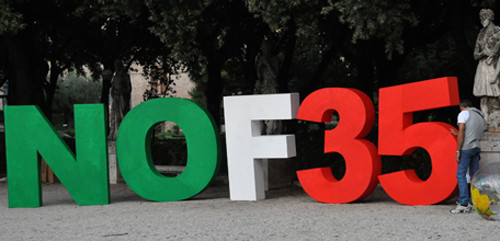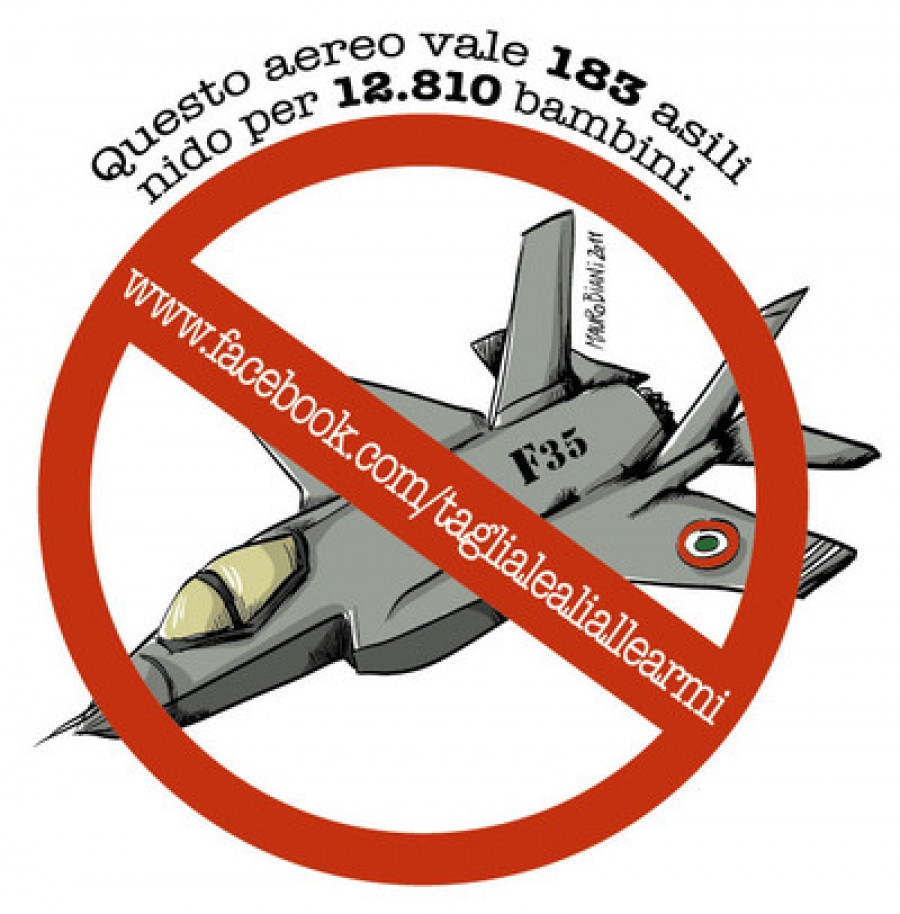You may have heard that the troubled Lockheed Martin F-35 Lightning II, Britain’s newest fighter jet, failed to turn up at this summer’s Farnborough Air Show after an engine fire occurred in one of its production models. This incident once again brought to the fore long-standing concerns about the poor reliability and exorbitant cost of the jets; which sell for the ‘modest’ price of $100m-a-unit. Unfortunately the UK has already bought 14 F-35Bs and is committed to buying 48 in total.
But the UK isn’t the only country where the largest weapons program in history has been controversial. After the UK, Italy is the biggest contributor to the development and procurement of the fighter jets program. In 2008 it planned to buy 131 F-35s, a purchase that would have probably gone ahead with no major hiccups if it hadn’t been for the constant mobilization of civil society and anti-militarist groups such as Rete per il Disarmo (Network for Disarmament).
Activists have pushed hard in the last few years in order to further broaden support against the purchase. People from all walks of life have added their voices to the Tagli le Ali alle Armi (Cut wings to weapons) petition asking the government to change direction. As Francesco Vignarca, coordinator of Rete per il Disarmo, told us, ‘the F35 case has become a major issue in Italian politics. It is the first time that a problem concerning military spending and purchase of weapons has become nationwide, with now nearly 60% of Italian against the programme’.
Thanks to strenuous grassroots campaigning, politicians have slowly started to reconsider the faults of the program and in 2012 a first cut was decided from 131 to 90 fighter jets. In May 2014, the Lower House defence committee recommended halving the government’s budget for the jet fighters and today the Parliament finally decided to follow these recommendations. While this development clearly falls short of the campaigners’ and opposition parties’ aim of seeing the procurement ditched all together, it nevertheless represents an important step forward.
It is easy to see why the campaign has had such a positive and widespread reception since its beginning in 2009. At a time when Italy’s economy is in dire straits and the unemployment rate stuck at 12.6%, one wonders how the government can justify spending a staggering amount of money which, considering development and maintenance costs, has been estimated to be close to €52 billion. Leaving aside the fact that the F35 may soon be technologically outdated, it is evident that such a purchase would be ethically and economically wrong,
What can we learn from the Italian campaign? The campaign once again emphasises the disconnect between politicians and the priorities of ordinary people. Furthermore, it shows how important it is to provide a positive alternative to the aggressive militarisation of society. To this effect, a series of videos have been produced that creatively show how much education, healthcare and other public services could benefit if they received the same level of investment that the F35s could potentially get.
Over the next year, CAAT will be campaigning for the UK government and trade unions to shift their priorities from the arms trade to renewable energies this would be better for people, better for jobs and better for the environment. If we want to live in a more sustainable and safer world we need to loudly point out that it is simply unacceptable that taxpayers fund arms Research & Development 30 times more than on renewable energy R&D.
The Italian example and the recent Swiss referendum against similar fighter jets demonstrate that the struggle against the arms lobby is a global one. For this reason, it is important that we, as activists, constantly learn from the successes and failures of social movements worldwide.



